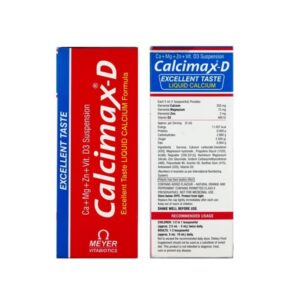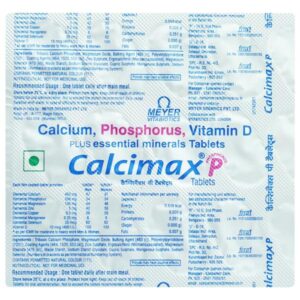VIT D3 + ZINC + CALCIUM + MAGNESIUM
Vit D3: Vitamin D3, also known as cholecalciferol, is a form of vitamin D that is produced naturally in the skin when it is exposed to sunlight. It is essential for maintaining healthy bones and teeth, as well as for supporting immune function.
Vitamin D3 works by promoting the absorption of calcium and phosphorus from the digestive system into the bloodstream. It helps to regulate the levels of these minerals in the body, which are necessary for bone growth, maintenance, and repair. Additionally, vitamin D3 has anti-inflammatory properties and is involved in cell growth and differentiation.
Vitamin D3 supplements are commonly used to treat or prevent vitamin D deficiency. It is prescribed for individuals who have limited sun exposure, as well as for those who have conditions that can affect the absorption or metabolism of vitamin D, such as liver or kidney diseases. It is also used in the management of conditions like osteoporosis, rickets, and osteomalacia.
The recommended daily dose of vitamin D3 varies depending on age, sex, and individual needs. It is typically taken orally in the form of tablets or capsules. The usual recommended dose for adults is 600-800 international units (IU) per day. However, higher doses may be prescribed for individuals with severe deficiency or certain medical conditions.
Vitamin D3 supplements are generally safe when taken as prescribed. However, excessive doses of vitamin D3 can lead to toxicity, known as hypervitaminosis D, which can cause symptoms such as nausea, vomiting, weakness, increased thirst, frequent urination, weight loss, and kidney problems. It is important to follow the recommended dosage and consult a healthcare professional before starting or adjusting supplementation.
It is worth noting that vitamin D can interact with certain medications, such as corticosteroids and certain anti-seizure medications. It is important to inform your healthcare provider about all the medications you are taking to avoid any potential drug interactions.
In summary, Vitamin D3 is a supplement used to prevent or treat vitamin D deficiency. It promotes the absorption of calcium and phosphorus, supporting bone health and immune function. The recommended dose varies depending on the individual’s needs, and it is generally safe when taken as prescribed. However, excessive doses can lead to toxicity, so it is important to follow the recommended dosage and consult a healthcare professional before starting supplementation.
Zinc: Zinc is a metallic element that is essential for many physiological functions in the human body. It is commonly used as a dietary supplement to support overall health and prevent zinc deficiency.
Mechanism of action: Zinc plays a vital role in various biochemical processes, including enzyme activity, immune function, DNA synthesis, and wound healing. It acts as a cofactor for numerous enzymes, aiding in the metabolism of carbohydrates, proteins, and fats. Zinc also has antioxidant properties and helps regulate gene expression.
Use: Zinc supplements are primarily used to prevent or treat zinc deficiency. This can occur due to inadequate dietary intake, certain medical conditions, or increased zinc requirements, such as during pregnancy or in cases of chronic illnesses. Zinc is also used to support immune function, reduce the duration and severity of cold symptoms, and promote wound healing.
Dose: The recommended daily intake of zinc varies based on age, sex, and specific physiological condition. Generally, the daily recommended allowance for adults is around 11 mg for males and 8 mg for females. However, higher doses may be required for certain conditions or under the guidance of a healthcare professional.
Side effects: When taken within the recommended dosage, zinc is generally safe for most individuals. However, in some cases, high doses of zinc or long-term use can lead to adverse effects, including nausea, vomiting, diarrhea, stomach cramps, and headaches. Prolonged excessive intake can also impair copper absorption, leading to copper deficiency. It is important to follow the recommended dosage guidelines and consult a healthcare professional before starting zinc supplements, especially if you have any underlying medical conditions or are taking other medications.
Calcium: Calcium is a mineral that is essential for proper functioning of the body. It is commonly known for its role in maintaining strong bones and teeth. However, calcium also plays a vital role in nerve function, muscle contraction, blood clotting, and maintaining a regular heartbeat.
Calcium supplements are used to treat and prevent calcium deficiency. They are prescribed for conditions such as osteoporosis, osteopenia, rickets, and hypoparathyroidism. Calcium supplements may also be recommended during pregnancy and breastfeeding, as well as in people who have malabsorption issues.
The mechanism of action of calcium involves its absorption into the bloodstream after ingestion. It is then transported to the bones, where it assists in bone formation and maintenance of bone density. Calcium also binds to proteins that regulate muscle contractions, nerve impulses, and blood clotting.
The recommended daily dose of calcium varies depending on a person’s age and sex. For adults aged 19-50, the recommended dose is 1000 mg per day, increasing to 1200 mg per day for women over 50 and men over 70. Calcium supplements are available in various forms, such as calcium carbonate and calcium citrate, and are usually taken orally with or without food.
While calcium supplements are generally safe when taken at recommended doses, they may cause side effects in some individuals. Common side effects include constipation, bloating, and gas. These can be minimized by taking the supplement with food or splitting the dose throughout the day. Excessive intake of calcium may lead to hypercalcemia, a condition characterized by high levels of calcium in the blood, which can cause symptoms like nausea, excessive thirst, confusion, and irregular heartbeat.
It is important to note that calcium supplements may interact with certain medications, such as antibiotics, thyroid medications, and calcium channel blockers. It is advisable to consult a healthcare professional before starting or altering the dosage of calcium supplements, especially if you have any underlying medical conditions or are taking other medications.
Magnesium: Magnesium is a mineral and an essential nutrient for the human body. It plays a crucial role in many bodily functions, including muscle relaxation, nerve function, and the maintenance of strong bones. Magnesium is also available as a supplement in the form of magnesium salts, such as magnesium oxide, magnesium citrate, and magnesium sulfate.
Magnesium is used as a dietary supplement to prevent or treat magnesium deficiency, which can occur due to certain medical conditions, poor diet, or as a side effect of certain medications. It is also used to relieve symptoms of constipation and heartburn.
The exact mechanism of action of magnesium is not fully understood. However, it is known to play a crucial role in many enzymatic reactions in the body. It helps regulate muscle and nerve function by influencing calcium levels, which in turn affects muscle contraction and relaxation. Magnesium also helps with the synthesis of DNA, RNA, and proteins, and aids in energy production.
The recommended daily intake of magnesium varies depending on age, sex, and other factors. Adult males should aim for around 400-420 mg/day, while adult females should aim for 310-320 mg/day. Higher doses may be needed for pregnant or lactating women and individuals with specific medical conditions.
When taken orally, magnesium is generally considered safe for most people. However, in some cases, it can cause side effects such as diarrhea, nausea, vomiting, stomach cramps, and bloating. These side effects are usually dose-dependent and can be minimized by reducing the dosage. In rare cases, excessive magnesium intake can lead to more severe symptoms like irregular heartbeat, low blood pressure, and difficulty breathing. It is important to consult a healthcare professional before taking magnesium supplements, especially if you have any underlying medical conditions or are taking other medications.





